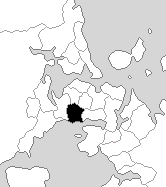
Wairarapa is a New Zealand parliamentary electorate. It was first created in 1858 and existed until 1881. It was recreated in 1887 and has since existed continuously. In the early years, the electorate was for a time represented by two members. Wairarapa has been held by Kieran McAnulty since the 2020 election.
Hauraki is a former New Zealand parliamentary electorate, from 1928 to 1987 and 1993 to 1996. In the 1987 general election it was renamed Coromandel, the name that had been used from 1972 to 1981. In 1993 it reverted to Hauraki, but became Coromandel again for the first MMP election in 1996.
Hamilton is a former New Zealand parliamentary electorate that existed from 1922 to 1969. The electorate covered the urban area of the city of Hamilton. In 1969, the city was part of two rural electorates, Hamilton East and Waikato. For the 1972 election, the nature of Hamilton East changed to urban, and the Hamilton West electorate complements it to form a second urban electorate.
Raglan is a former New Zealand parliamentary electorate. It existed for three periods between 1861 and 1996 and during that time, it was represented by 13 Members of Parliament.
Waimarino was a New Zealand parliamentary electorate that existed from 1911 to 1954, and from 1963 to 1972. It was rural in nature and was represented by four Members of Parliament.
Franklin was a rural New Zealand parliamentary electorate. It existed from 1861 to 1996 during four periods.
Gisborne is a former New Zealand parliamentary electorate. It existed from 1908 to 1996, and it was represented by 12 Members of Parliament.
Waitemata was a New Zealand parliamentary electorate, from 1871 to 1946, and then from 1954 to 1978. It was represented by 18 members of parliament.
Manukau is a former New Zealand parliamentary electorate in the south Auckland Region. It existed from 1881 to 1978, with a break from 1938 to 1954. It was represented by nine Members of Parliament. Two by-elections were held in the electorate.
Wallace was a New Zealand parliamentary electorate. It was established in 1858, the first election held in 1859, and existed until 1996. From 1861 to 66, it was represented by two members. In total, there were 18 Members of Parliament from the Wallace electorate.
Grey Lynn is a former New Zealand parliamentary electorate, in the city of Auckland. It existed from 1902 to 1978, and was represented by nine Members of Parliament.
Wellington South is a former New Zealand parliamentary electorate. It existed for two periods between 1881 and 1946. It was represented by seven Members of Parliament.
Pahiatua is a former New Zealand parliamentary electorate in the Wairarapa region. It existed from 1896 to 1996, and was represented by nine Members of Parliament, including Prime Minister Keith Holyoake for 34 years.
Buller is a former New Zealand parliamentary electorate, from 1871 to 1972. It was represented by eleven Members of Parliament.
Dunedin West was a New Zealand parliamentary electorate, in the city of Dunedin. It existed for three periods between 1881 and 1996 and was represented by seven Members of Parliament.
Hurunui was a parliamentary electorate in the Canterbury region of New Zealand, from 1902 to 1963.
Marsden was a former parliamentary electorate, in the Whangarei District and in the Northland Region of New Zealand, which existed from 1858 to 1972. Upon its abolition, Marsden was replaced with the Whangarei electorate.
Wellington North was, from 1905 to 1946, a parliamentary electorate within the area encompassing New Zealand's capital, Wellington. The electorate was represented by four Members of Parliament.
Westland was a parliamentary electorate in the West Coast of New Zealand from 1866 to 1868 and 1890 to 1972. In 1972 the Tasman and West Coast electorates replaced the former Buller and Westland electorates.
Dunedin Central was a parliamentary electorate in the city of Dunedin in Otago, New Zealand from 1881 to 1890 and 1905 to 1984.

